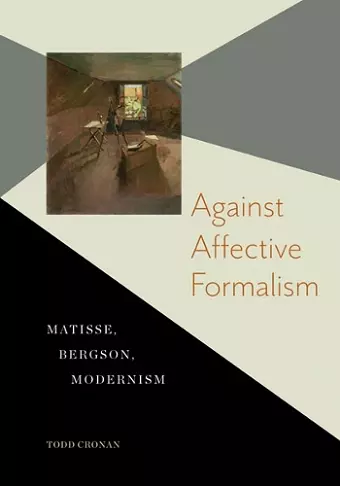Against Affective Formalism
Matisse, Bergson, Modernism
Format:Paperback
Publisher:University of Minnesota Press
Published:1st Apr '14
Currently unavailable, and unfortunately no date known when it will be back

For nearly fifty years the humanities have been confined by a series of critiques: of the subject, of representation, of the visual, of modernism, of autonomy, of intention, of art itself. In their place various “materialities” have appeared: signs, identities, bodies, history, and works. Against Affective Formalism challenges these orthodoxies.
“What I am after, above all, is expression,” Henri Matisse declared. Matisse believed that through the careful arrangement of line and color he could transmit his feelings directly to the minds and bodies of his viewers. Yet Matisse continually struggled with the reality that his feelings were misunderstood—or simply ignored—by viewers of his art. Matisse oscillates between a desire for expressive command over the viewer and a sense of the impossibility of making himself known.
Against Affective Formalism confronts modernism’s dissatisfactions with representation. As Todd Cronan explains, a central tenet of modernist thought turns on the effort to overcome representation in the name of something more explicit in its capacity to generate bodily or affective experience. Henri Bergson was one of the most influential advocates of the antirepresentational impulse; his novel theories of memory and freedom gripped a generation of writers, philosophers, psychologists, and artists. Matisse and Bergson worked within and against the context of form and expression that remains in force today.
Writing in opposition to prevailing theories and assumptions about the relation of intention and form—most of which accept the “death of the author” as a basic fact of interpretation—Cronan argues that the beholder’s response to art, outside a framework of intentionality, is irrelevant to a work’s meaning. Intentions are not a matter of method at all: no letter, biography, document, archive, or key will recover an intention. What matters is that intentions make works of art different from objects in the world.
"Todd Cronan’s juggernaut is several books in one. In the first place, it historicizes a crucial question in contemporary esthetics, whether or not a beholder’s experience of a work of art can properly be understood as affective rather than as cognitive. Second, it offers a strong rereading of various writings by Henri Bergson—whose philosophy has often been associated with the art of Matisse—with respect to that and related issues, showing in the end that although Bergson was continually tempted by the affective position, he never quite definitely succumbed to it. Third and most important, Cronan tracks the interplay between the affective and cognitivist viewpoints in the theory and practice of one of the great painters of the twentieth century, Henri Matisse; this sets Cronan on a collision course—from which he does not flinch —with the almost uniformly affective bias of recent Matisse criticism. Against Affective Formalism is a major achievement, and I look forward with fascination to its reception by a field that is likely to be transformed by it." —Michael Fried, Johns Hopkins University
"Matisse knows that sensations belong to - or alas have been detached from - particular human occasions, ways of being, forms of life. But the exacerbation of colour in Matisse speaks, dialectically, to the lack of particularity that makes us 'modern'. This to and fro of contraries is dealt with powerfully in a new book by Todd Cronan, Against Affective Formalism: Matisse, Bergson, Modernism. Colour, for Matisse - pure sensation, the stuff of the senses - will make, will be, a form of life. And at the same time it will enact the extremity - the uncanniness - of the wish."
- T. J. Clark, "The Urge to Strangle," The London Review of Books
ISBN: 9780816676033
Dimensions: 254mm x 178mm x 38mm
Weight: unknown
336 pages